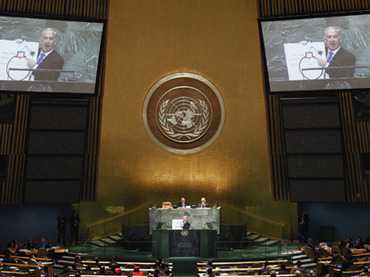
Israel has rebuffed a UN call to adhere to the Nuclear Non Proliferation Treaty (NPT) and open itself to international inspectors, calling the suggestion a “meaningless mechanical vote” of a body that “lost all its credibility regarding Israel.”
In a 174-6 vote, the United Nations General Assembly demanded in a non-binding call that Tel Aviv join the NPT“without further delay,” in an effort to create a legally binding nuclear-free Middle East.
Washington, Israel’s strongest ally, surprised no one by voting against the resolution – but did approve two paragraphs that were voted on separately, which called for universal adherence to the NPT and for all non-signatory governments to join.
The UN body “has lost all its credibility regarding Israel with these types of routine votes that are ensured passage by an automatic majority and which single out Israel,” Foreign Ministry spokesman Yigal Palmor was quoted by Jerusalem Post as saying.
The Assembly’s call on Israel comes days after a large majority of its members voted to grant Palestine statehood state status and just weeks after the an escalation of violence between Gazans and Israel’s occupation forces. Palmor stressed, however, that since the NPT vote takes place annually, the Palestinian victory is not connected.
Israel is not a signatory to the 1970 Nuclear Non Proliferation Treaty, the main objective of which is to is to prevent the spread of nuclear weapons and weapons technology. Despite near-universal acknowledgement that Tel Aviv maintains a powerful nuclear arsenal, Israeli officials promote a position claiming their government will “not be the first country to introduce weapons into the Middle East.”
The Middle East’s only democracy possesses as many as 400 nuclear warheads, along with various ways to deliver them. It is also one of four countries known to have nuclear weapons that are not recognized as Nuclear Weapons States by the NPT. The others are India, North Korea and Pakistan.
Israel follows a policy known as “nuclear opacity,” which it sees as a deterrent against its neighbors.
The timing of the Israeli dismissal of the call for transparency comes less than two weeks after Washington’s withdrawal from December’s nuclear-free Middle East conference, to be held in Finland and sponsored by Russia, the UK and the US.
State Department officials said the international effort is being postponed because of “a deep conceptual gap [that] persists in the region on approaches towards regional security and arms control arrangements,” and because “states in the region have not reached agreement on acceptable conditions” for the meeting, quotes the IPS.
But many blamed Israel’s refusal to accept the terms as the real reason for postponing the regional nuclear drive.
“The truth is that the Israeli regime is the only party which rejected to conditions for a conference,” Iranian diplomat Khodadad Seifi told the General Assembly on Monday, as he called for “strong pressure on that regime to participate in the conference without any preconditions.”
The meeting is now expected to be held early next year.
There are currently five nuclear-weapon-free zones in the world, according to the UN: Latin America and the Caribbean, the South Pacific, South-East Asia, Central Asia, and Africa.
RT’s Paula Slier is exploring the controversies surrounding Israel’s nuclear activities.

Leave a Reply